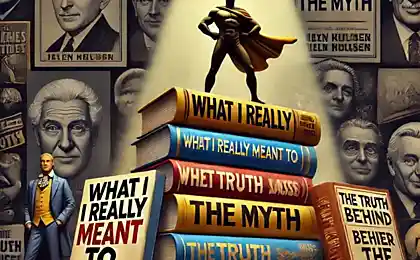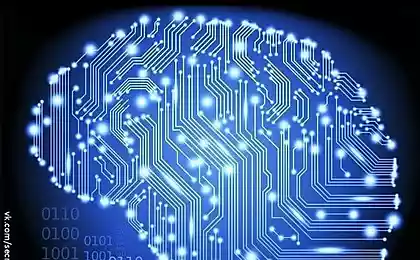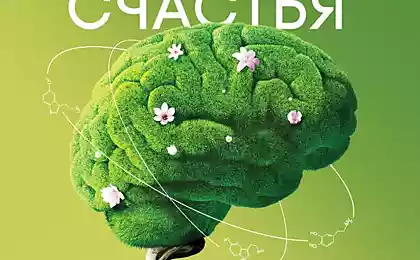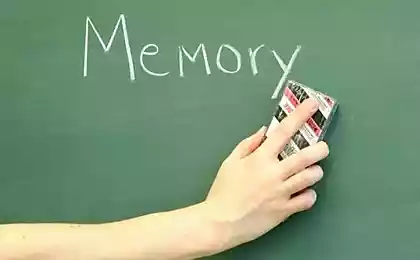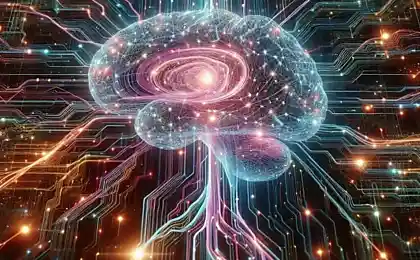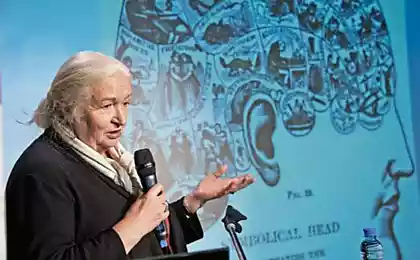630
Can your brain actually "filled"?
The brain is a real miracle. Seemingly endless library shelves which keep our most precious memories and knowledge of our lives. Is there a moment when it reaches its limit? In other words, could our brain be "filled"?
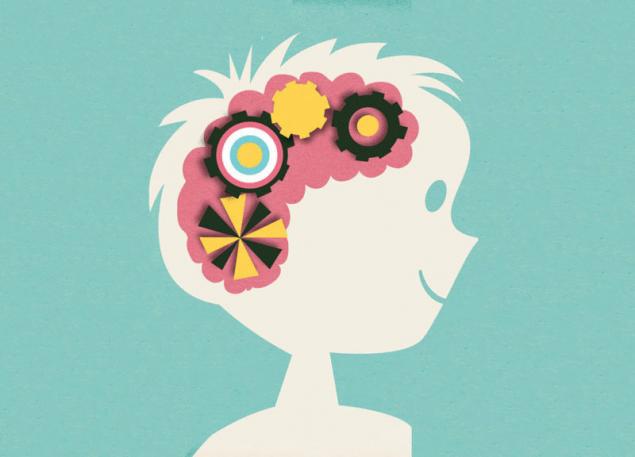
The answer would be "no" but the explanation will take time, because the brain is a little more complicated than just a piggy Bank. A study published in Nature Neuroscience, showed that instead of simply to accumulate, the old information is sometimes pushed out of the brain, freeing up space for new memories.
Previous behavioral studies have shown that learning new information can lead to forgetting. However, in this study, researchers used a new brain imaging methods for the first time to demonstrate how this effect is manifested in the brain.
Eksperimentatora work has set a goal to find out what happens in the brain when we try to remember the information, similar to what we already know. This is important, because similar information is likely to be mixed in with existing knowledge and to displace such.
To do this, the researchers investigated how the brain activity when we try to remember the "target" information, that is, trying to remember something specific, trying simultaneously to learn something similar ("competing" memory). Participants were taught to associate one word (say the word "sand") with two different images — Marilyn Monroe and hat.
It turned out that as soon as the target information is remembered more brain activity for her grew. Meanwhile, the activity of the brain for competing information simultaneously decreased. This change was particularly noticeable for areas near the front of the brain like the prefrontal cortex, compared to the key memory structures in the middle of the brain like the hippocampus, which are usually associated with memory loss.
The prefrontal cortex is involved in a number of complex cognitive processes like planning, decision making and selective retrieval of memories. Extensive research shows that this part of the brain works in conjunction with the hippocampus to retrieve specific memories.
If the hippocampus is a search engine, the prefrontal cortex is the filter that determines which memory will be more relevant. This suggests that only one information storage is not enough for good memory. The brain must also be able to access relevant information without being distracted by similar competing pieces of information.
Better Sabitov everyday life forgetting has obvious advantages. Imagine, for example, that you lost your Bank card. New card you receive will come with a new PIN. Studies show that whenever you memorize a new PIN, you gradually forget the old one. This process improves access to relevant information, and old information does not interfere.
Most of us know this feeling when old memories interfere with new, relevant. Let's say you try to remember where you parked your car in the same fleet, where they were a week ago. This type of memory (when you try to remember a new one, but like information) is particularly susceptible to interference.
When we get new information, the brain automatically tries to incorporate it into existing information, forming associations. And when we receive information, at the same time associative POPs up, but irrelevant information.
Most previous studies have focused on how we learn and remember new information. But modern research is starting to pay more attention to the conditions under which we forget their importance begins to grow.
The curse pamalican few people are able to recall almost every detail of his life in minute detail; they giperkineticeski syndrome. Name the date, and they'll tell you where they were and what they did that day. And although it may sound like a boon for many people gifted with this ability often find it burdensome.
Some have reported the inability to think about the present or future, as if constantly living in the past, trapped by their memories. We are all, in principle, could suffer from this, if our brains had no mechanism for updating information that no longer meets the relevance and considered unnecessary.
At the other end of the spectrum is the phenomenon which is called "accelerated long-term forgetting", it is often observed in epilepsy and stroke. As the name implies, people forget just received the information much more rapidly, sometimes within a few hours; it's not normal.
It is believed that it is based on a refusal to "consolidate" or transfer new memories into long term memory. But the processes and impact of this form of forgetting remain largely unexplored.
Studies in this area demonstrate that remembering and forgetting are two sides of the same coin. In a sense, forgetting is a mechanism of sorting of memories in our brain that at hand has remained the most relevant memories. Normal forgetfulness can be a security mechanism that keeps our brain from being overwhelmed.published
P. S. And remember, just changing your mind — together we change the world! ©
Source: hi-news.ru

The answer would be "no" but the explanation will take time, because the brain is a little more complicated than just a piggy Bank. A study published in Nature Neuroscience, showed that instead of simply to accumulate, the old information is sometimes pushed out of the brain, freeing up space for new memories.
Previous behavioral studies have shown that learning new information can lead to forgetting. However, in this study, researchers used a new brain imaging methods for the first time to demonstrate how this effect is manifested in the brain.
Eksperimentatora work has set a goal to find out what happens in the brain when we try to remember the information, similar to what we already know. This is important, because similar information is likely to be mixed in with existing knowledge and to displace such.
To do this, the researchers investigated how the brain activity when we try to remember the "target" information, that is, trying to remember something specific, trying simultaneously to learn something similar ("competing" memory). Participants were taught to associate one word (say the word "sand") with two different images — Marilyn Monroe and hat.
It turned out that as soon as the target information is remembered more brain activity for her grew. Meanwhile, the activity of the brain for competing information simultaneously decreased. This change was particularly noticeable for areas near the front of the brain like the prefrontal cortex, compared to the key memory structures in the middle of the brain like the hippocampus, which are usually associated with memory loss.
The prefrontal cortex is involved in a number of complex cognitive processes like planning, decision making and selective retrieval of memories. Extensive research shows that this part of the brain works in conjunction with the hippocampus to retrieve specific memories.
If the hippocampus is a search engine, the prefrontal cortex is the filter that determines which memory will be more relevant. This suggests that only one information storage is not enough for good memory. The brain must also be able to access relevant information without being distracted by similar competing pieces of information.
Better Sabitov everyday life forgetting has obvious advantages. Imagine, for example, that you lost your Bank card. New card you receive will come with a new PIN. Studies show that whenever you memorize a new PIN, you gradually forget the old one. This process improves access to relevant information, and old information does not interfere.
Most of us know this feeling when old memories interfere with new, relevant. Let's say you try to remember where you parked your car in the same fleet, where they were a week ago. This type of memory (when you try to remember a new one, but like information) is particularly susceptible to interference.
When we get new information, the brain automatically tries to incorporate it into existing information, forming associations. And when we receive information, at the same time associative POPs up, but irrelevant information.
Most previous studies have focused on how we learn and remember new information. But modern research is starting to pay more attention to the conditions under which we forget their importance begins to grow.
The curse pamalican few people are able to recall almost every detail of his life in minute detail; they giperkineticeski syndrome. Name the date, and they'll tell you where they were and what they did that day. And although it may sound like a boon for many people gifted with this ability often find it burdensome.
Some have reported the inability to think about the present or future, as if constantly living in the past, trapped by their memories. We are all, in principle, could suffer from this, if our brains had no mechanism for updating information that no longer meets the relevance and considered unnecessary.
At the other end of the spectrum is the phenomenon which is called "accelerated long-term forgetting", it is often observed in epilepsy and stroke. As the name implies, people forget just received the information much more rapidly, sometimes within a few hours; it's not normal.
It is believed that it is based on a refusal to "consolidate" or transfer new memories into long term memory. But the processes and impact of this form of forgetting remain largely unexplored.
Studies in this area demonstrate that remembering and forgetting are two sides of the same coin. In a sense, forgetting is a mechanism of sorting of memories in our brain that at hand has remained the most relevant memories. Normal forgetfulness can be a security mechanism that keeps our brain from being overwhelmed.published
P. S. And remember, just changing your mind — together we change the world! ©
Source: hi-news.ru
Nikolai Amosov: do Not expect that doctors will make you healthy
Planted annual flowers in the country



